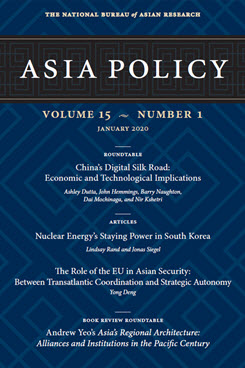Reconstructing Order
The Geopolitical Risks in China’s Digital Silk Road
This essay examines the strategic intentions and origins of the Digital Silk Road and the implications for the U.S. and like-minded countries.
EXECUTIVE SUMMARY
MAIN ARGUMENT
The People’s Republic of China (PRC) is attempting to incrementally reshape the global order through the Belt and Road Initiative (BRI). To this end, it is using—among other means—new disruptive technologies that will allow it to dominate data and communications in the political, economic, and social realms across the large expanse of the initiative. The Digital Silk Road has been a part of the PRC’s approach since at least 2015, when it first appeared in a government white paper on BRI. The Digital Silk Road binds together new technologies in “bundles,” such as smart cities, smart ports, and satellite-networked communications, using 5G as a baseline for other technologies like artificial intelligence, data analytics, and the Internet of Things. Success in using this communications infrastructure to dominate markets, standards, and political elites would give China a multiregional base from which to project its norms, systems, and networks to the wider global market. In the long run, this will not only give a competitive advantage to Chinese companies but also allow them to spread more widely across remaining markets.
POLICY IMPLICATIONS
- The Digital Silk Road has deep geopolitical implications. Building the backbone of communications infrastructure in BRI countries will allow the PRC to access, analyze, and exploit in real time the large data sets of recipient countries.
- Through these technologies and its tech companies, the PRC is exporting its governance model, surveillance system, and financial institutions.
- Policy elites in recipient nations could become vulnerable to even greater influence operations as Chinese tech companies administer their networks in real time and collaborate with stage actors like the United Work Front Department.
- The PRC could use the centralization of data in smart port systems to create a deniable, surgical sanctions system by interdicting or slowing the container traffic of states or their leaders.
John Hemmings is an Associate Professor at the Daniel K. Inouye Asia-Pacific Center for Security Studies in Hawaii. He also holds adjunct fellowships with the Center for Strategic and International Studies and Pacific Forum. His areas of focus are Northeast Asian security, Japanese defense policy, the Indo-Pacific concept, alliance theory, and U.S. alliances, with a special interest in 5G. His academic work has appeared in International Affairs, the RUSI Journal, Issues and Insights, and International Politics Review.
About Asia Policy
Asia Policy is a peer-reviewed scholarly journal presenting policy-relevant academic research on the Asia-Pacific that draws clear and concise conclusions useful to today’s policymakers. Asia Policy is published quarterly in January, April, July, and October and accepts submissions on a rolling basis. Learn more



